Travel Guide to Aswan, Egypt
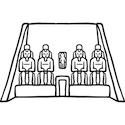
Ra's Travel Guide to Aswan
Known as a gateway to Nubia; a complete travel guide to Aswan.
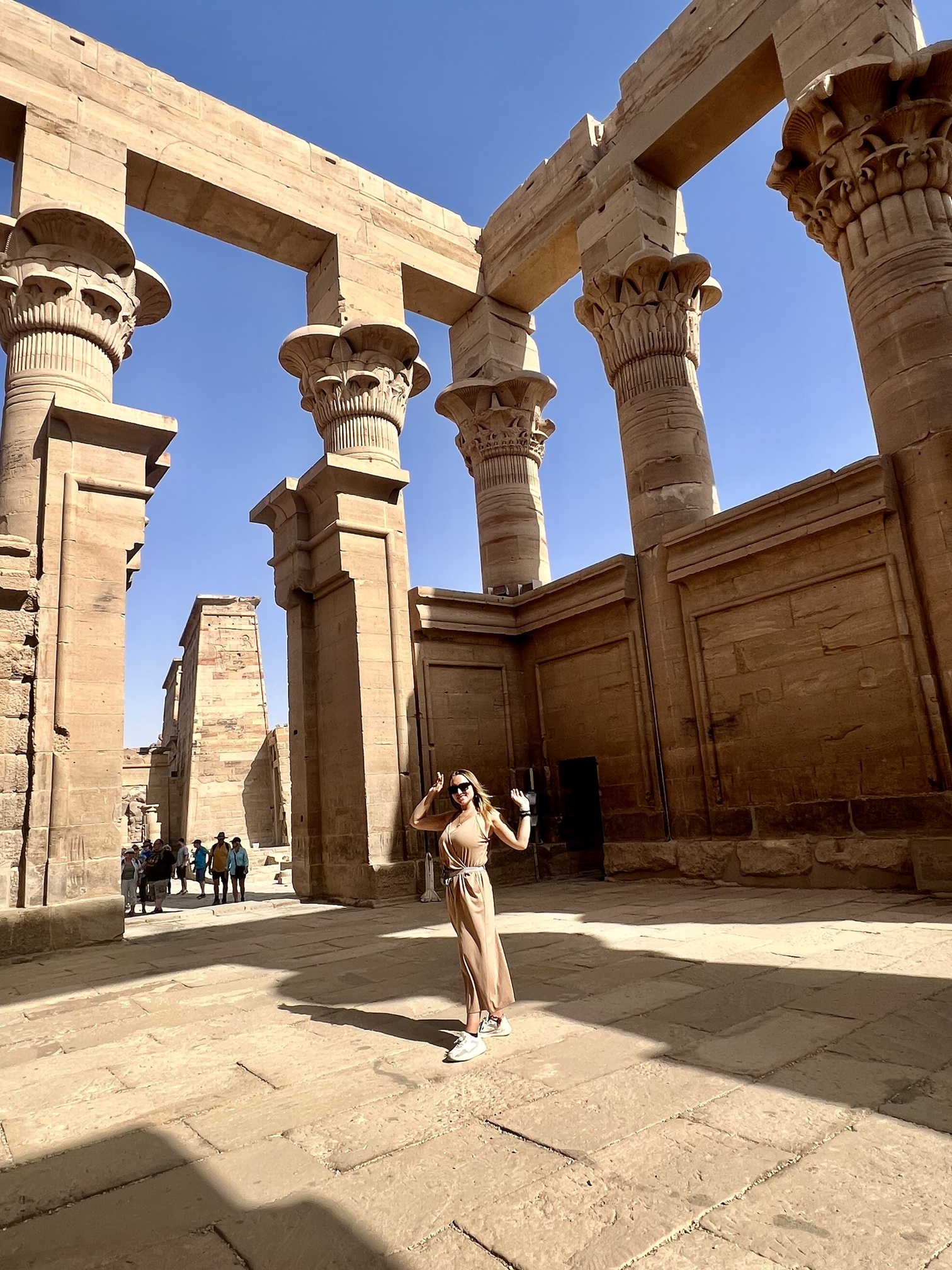
Travel Guide to Aswan- Key Highlights
- Discover the serene beauty of Aswan, a city in southern Egypt known for its laid-back atmosphere and stunning Nile River views.
- Explore ancient temples such as Philae Temple, Abu Simbel, and Kom Ombo, showcasing the grandeur of ancient Egyptian civilization.
- Immerse yourself in the vibrant Nubian culture by visiting the Nubian Museum, exploring traditional villages, and enjoying a felucca ride.
- Witness modern engineering marvels like the Aswan High Dam and learn about their impact on the region.
- Experience the unique charm of Aswan with a stay at the historic Old Cataract Hotel and indulge in authentic Egyptian cuisine.
Introduction- Visit Alexandria, Egypt
Step back in time as you explore Aswan City, a captivating destination in southern Egypt that seamlessly blends ancient history with modern charm. Known for its laid-back ambiance and breathtaking Nile River views, Aswan offers a unique perspective on ancient Egypt and the Middle East. Delve into a world of pharaohs, temples, and vibrant Nubian culture, all while savoring the flavors of traditional Egyptian cuisine in the city of Aswan. This travel guide to Aswan will help you maximize your visit!
Discovering Aswan- Why Aswan is a Must-Visit Destination
Aswan boasts an array of ancient monuments that transport you to the time of pharaohs and legendary tales. Prepare to be awestruck by the majestic Philae Temple, dedicated to the goddess Isis. Its intricate carvings and towering pillars stand as a testament to the architectural prowess of the ancient Egyptians.
Immerse yourself in Nubian history and culture at the Nubian Museum, home to a fascinating collection of artifacts. Discover the vibrant traditions, music, and craftsmanship of this ancient civilization.
From exploring the Unfinished Obelisk to wandering through the ancient tombs of the nobles, Aswan promises a captivating journey through time. Every corner holds a story waiting to be uncovered.
The Unique Charm of Aswan Compared to Other Egyptian Cities
Unlike the bustling energy of Cairo or the historical intensity of Luxor, Aswan offers a more relaxed and intimate experience. Stroll through colorful Nubian villages, where you'll be greeted with warm smiles and invitations to try traditional hibiscus tea.
Witnessing the Aswan High Dam, a marvel of modern engineering, is a must-do. This impressive structure controls the Nile's flow and stands as a testament to human ingenuity.
For a touch of old-world glamour, indulge in a stay at the legendary Old Cataract Hotel. This historic hotel, perched on the banks of the Nile, has hosted royalty and luminaries like Winston Churchill and Agatha Christie.
Getting Ready for Your Aswan Adventure
Before you embark on your Aswan escapade, let's make sure you're well-prepared to make the most of your journey. From essential travel documents to packing tips and cultural insights, this guide will equip you with everything you need for a smooth and rewarding experience.
Essential Travel Documents and Requirements
First things first, ensure your passport is valid for at least six months beyond your intended stay in Egypt. Most travelers will need a visa to enter the country. You can obtain a tourist visa on arrival at Aswan International Airport or apply for one online in advance.
Travel insurance is highly recommended to protect yourself against unexpected events such as medical emergencies or trip cancellations. Be sure to choose a plan that covers your specific needs and activities.
For the latest travel tips and advisories, check with your home country's embassy or consulate in Egypt. They can provide up-to-date information on safety, health, and any entry restrictions.
What to Pack: From Clothing to Gadgets
Aswan enjoys sunny skies and warm temperatures year-round, so pack light, breathable clothing such as cotton shirts, linen pants, and flowy dresses. Don't forget a swimsuit for relaxing by the pool or taking a dip in the Nile.
Comfortable footwear is essential for exploring ancient sites and strolling through markets. Opt for sandals, walking shoes, or sneakers that can withstand long days on your feet.
Here are a few extra essentials you won’t want to leave behind:
- Sun Protection: A hat, sunglasses, and a high-SPF sunscreen are crucial for shielding yourself from the strong Egyptian sun.
- Travel Adapter: Egypt uses 220-volt electricity with two-pronged round pins, so bring a travel adapter if your devices use a different plug type.
Learning Basic Arabic Phrases for Easier Communication
While English is widely spoken in tourist areas, learning a few basic Arabic phrases will enhance your interactions with friendly locals and enrich your cultural experience. Simple greetings like “Salam” (hello) and “Shukran” (thank you) go a long way.
If you're planning on taking a Nile cruise or hiring a local boat, knowing a few phrases related to directions and prices will come in handy. Ask your hotel or guide for assistance with pronunciation and common travel-related vocabulary.
Remember, even a few words can break the ice, demonstrate respect for the local culture, and make your Aswan adventure even more meaningful.
How to Get to Aswan
Getting to Aswan is part of the adventure! With various transportation options available, you can choose the one that best suits your itinerary and preferences. Whether you prefer the scenic route or a quicker journey, Aswan is well-connected to other parts of Egypt.
Plane
Flying to Aswan is the quickest and most convenient option. Aswan International Airport (ASW) is well-connected with major Egyptian cities, including Cairo and Luxor. Direct flights from Cairo to Aswan take approximately 1 hour and 20 minutes. Several airlines operate this route, offering various flight times throughout the day. Upon arrival at Aswan International Airport, you can easily find taxis or car rentals to reach your final destination in the city.
Train
Traveling to Aswan by train provides a scenic and relaxed journey. Egyptian National Railways operates train services between Cairo and Aswan, with the trip taking around 12-14 hours, depending on the type of train. Opt for a sleeper train for a more comfortable overnight journey or choose a daytime train to enjoy the changing landscapes of Egypt. Trains from Cairo typically depart from Ramses Station and arrive at Aswan's main train station. Booking in advance is recommended, especially during peak travel times.
Car
Driving to Aswan offers the flexibility to explore at your own pace. From Cairo, the journey to Aswan covers approximately 850 kilometers (528 miles) and typically takes around 10-12 hours, depending on traffic and road conditions. The route primarily follows the desert road south, passing through several towns and offering scenic views of the Egyptian landscape. Be sure to plan for rest stops and ensure your vehicle is in good condition for the long drive. Renting a car or using a private driver are popular options for this route.
Bus
Taking a bus to Aswan is a cost-effective option. Several bus companies offer services from Cairo and other major cities. The journey by bus can take between 12-14 hours, depending on traffic and the specific route. Buses are usually equipped with basic amenities and may offer both standard and more comfortable seating options. Buses depart from Cairo’s main bus stations, such as the Cairo Gateway (Turgoman) or the Smart Village. It's advisable to book your tickets in advance and check the schedule for departure times.
When I visited Aswan, it was through a guided tour group through the whole country that also included a Nile River cruise from Luxor to Aswan. When planning your visit, if you're interested in booking a pre-packaged tour, consider booking a Nile River cruise to reach Aswan for a unique and relaxing experience.
For efficient route planning, cost evaluation, and consideration of various transportation methods, I often rely on Rome2rio. This invaluable tool provides comprehensive information, offering insights into possible route combinations and suggestions for strategic stops along the way, ensuring a tailored and well-informed travel experience. Link to Rome2rio
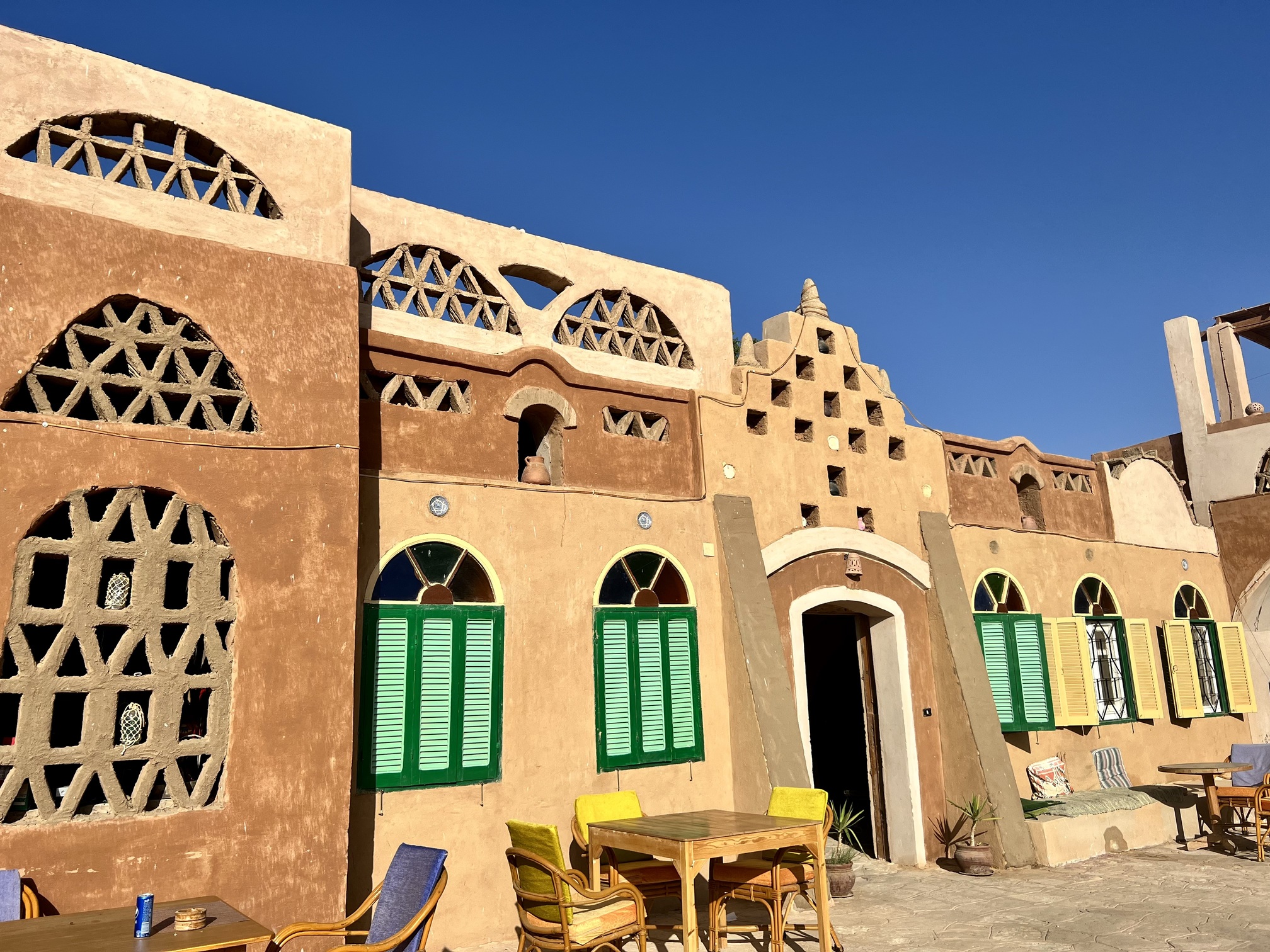
Where to Stay in Aswan?
From charming Nubian guesthouses to luxurious hotels with breathtaking Nile views, Aswan offers a diverse range of accommodation options to suit every budget and preference. Whether you're seeking an authentic cultural experience or a pampered retreat, you'll find the perfect place to rest and recharge after your daily adventures.
Choosing Between Nubian Guesthouses and Luxury Hotels
- Sofitel Legend Old Cataract Hotel: For a touch of luxury and history, this iconic hotel on the Nile’s banks offers elegant architecture, opulent interiors, and stunning sunset views.
- Nubian Guest Houses: For a culturally immersive experience, stay in a Nubian guest house in traditional villages. These provide a unique glimpse into local life and opportunities to connect with Nubian families.
- Modern Hotels: Many modern hotels in Aswan offer comfortable amenities and beautiful views. Consider what fits your budget, proximity to attractions, and desired ambiance.
Consider factors like proximity to attractions, your budget, and the overall ambiance you're seeking when making your choice.
When I visited Aswan, it was at the end of my Nile River cruise as the last stop before taking a day trip to Abu Simbel. This made it easy to see many locations in Egypt without having to worry about organizing accommodations in every city. More information about Nile Cruises is below.
Nile Cruise: Luxor to Aswan Scenic Journey
Embark on a timeless journey along the Nile River by taking a cruise from Luxor to Aswan (or vice versa). This classic Egyptian adventure offers a unique perspective on ancient wonders as you glide past temples, villages, and lush landscapes.
Most Nile cruises include stops at iconic sites such as the Philae Island, Kom Ombo, and Edfu Temple, allowing you to disembark and explore these historical treasures up close.
It is important to note that there are two types of Nile cruises available, felucca and cruiser. A felucca is essentially a large sailboat. This is best described as an on-the-water camping experience where you can sleep under the stars. There is a small kitchen on board for the crew to prepare traditional Egyptian food during your cruise. Before bedtime, the felucca will hook up with a floating restroom/night routine care boat on the water before continuing to sail throughout the night. For those not interested in the campaign option, a cruiser is essentially a small cruise ship with cabin rooms, restaurants, and on-board entertainment. The cruiser is usually the more expensive option.
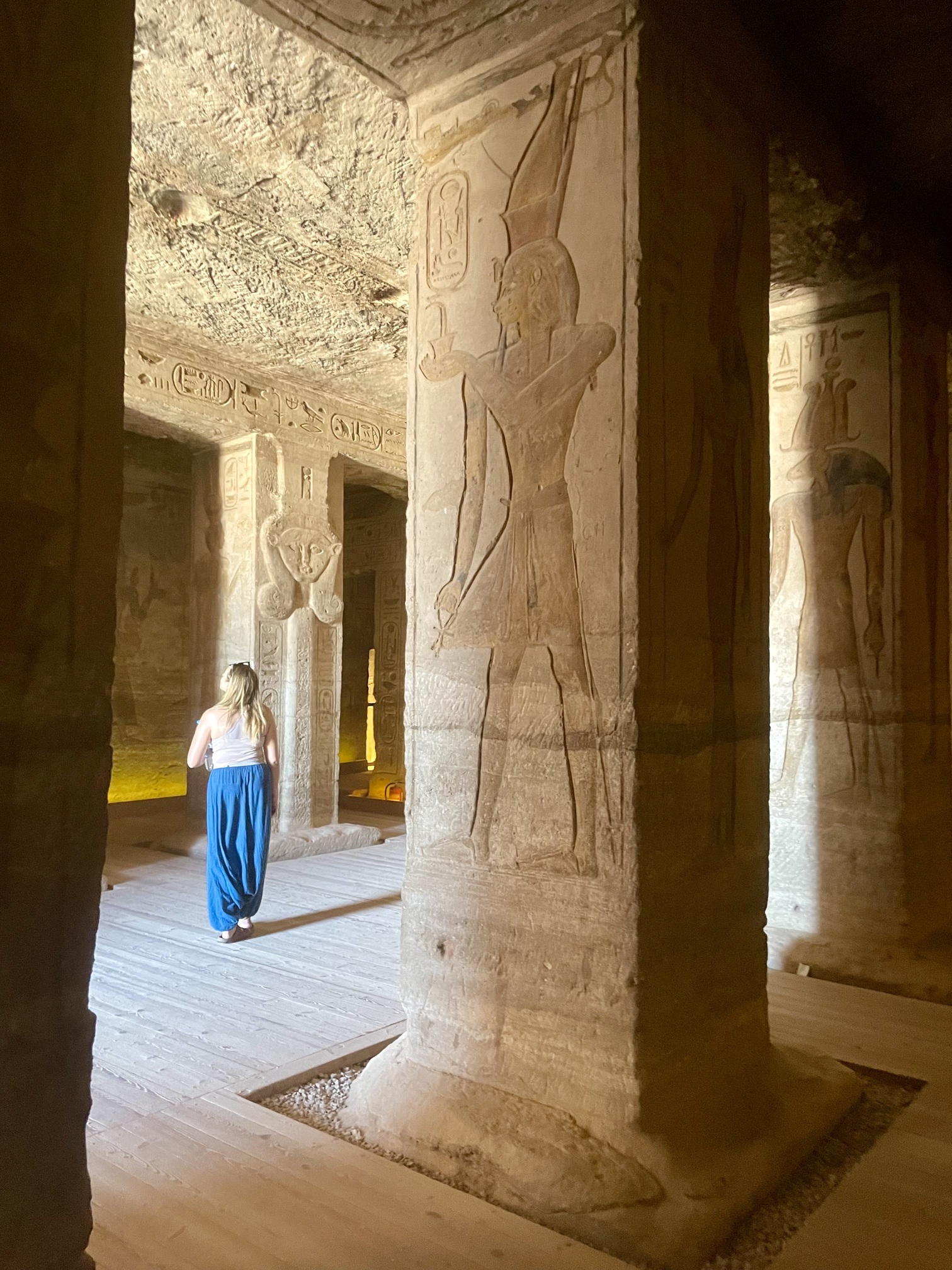
Guides to Egypt
Getting Around Aswan, Egypt
Car
Renting a car in Aswan provides the flexibility to explore the city and its surrounding attractions at your own pace. Major roads are generally well-maintained, and driving offers easy access to sites like the Nubian Museum and the Aswan High Dam. Be aware of local driving conditions and traffic rules, which may differ from those in your home country. Parking can be challenging in busy areas, so plan ahead and be prepared for limited parking spaces near popular attractions. For a more relaxed experience, consider hiring a local driver who knows the area well.
Taxi
Taxis are a prevalent mode of transport in Aswan, readily available throughout the city. When hailing a taxi, it's important to agree on a fare with the driver before starting your journey, especially if there's no meter.
Bargaining is a common practice, so don't hesitate to negotiate politely. Before hopping in, familiarize yourself with general taxi fare ranges to avoid being overcharged. Your hotel or local guide can provide helpful estimates.
For added security and peace of mind, consider using ride-hailing services like Uber or Careem, which are becoming increasingly popular in Egypt. These apps offer transparent pricing and a convenient way to book and track your rides.
Tour Group
Joining a group tour or booking a private tour is an excellent option for travelers seeking a well-organized and hassle-free experience. Reputable tour operators offer a range of itineraries that include transportation, accommodation, and guided excursions to major attractions in and around Aswan.
Private tours provide flexibility and allow you to customize your itinerary based on your interests and preferences. Your knowledgeable guide will provide insights into the history, culture, and hidden gems of the region.
Group tours offer a social and often more affordable way to explore Aswan. You’ll meet fellow travelers, enjoy the camaraderie of shared experiences, and benefit from the expertise of your tour leader.
Microbus
Exploring Luxor through guided tours is a great way to gain deeper insights into its rich history. With a knowledgeable guide, you'll easily navigate between sites like Karnak and the Valley of the Kings, while learning about their significance. Tours often provide exclusive access and help you avoid long lines, making your visit more seamless and enriching.
Ferry
Cruising along the Nile River is an integral part of the Aswan experience. Ferries offer a scenic and efficient way to access Elephantine Island, Kitchener’s Island, and the West Bank, each with its own unique charm.
Ferry crossings are frequent throughout the day, providing easy access to several Nubian villages. This is a great way to immerse yourself in local culture. Purchase tickets at the ferry terminals, and be prepared for short but enjoyable rides across the water.
As you glide along the Nile, take in the views of the city skyline, lush landscapes, and ancient wonders that line its banks. The gentle breeze and tranquil atmosphere make ferry rides a memorable part of your Aswan adventure.
Walking
Exploring Aswan on foot is a delightful way to experience the city's charm at a leisurely pace. The compact layout of Aswan’s central areas makes walking a practical option for short distances. Wander through bustling markets, stroll along the Nile Corniche for picturesque views, and visit local shops and cafes. Be sure to wear comfortable footwear and stay hydrated, especially during the warmer months. While walking is enjoyable, it's advisable to take precautions after dark, such as exploring with a guide or in a group to ensure safety.
What to Do in Aswan, Egypt
Ready to be captivated by Aswan's ancient wonders, cultural treasures, and scenic beauty? From exploring legendary temples to immersing yourself in the vibrant Nubian culture, Aswan offers a kaleidoscope of unforgettable experiences.
Philae Temple
No trip to Aswan is complete without a visit to the Philae Temple, an architectural marvel dedicated to the goddess Isis. Located on an island in the Nile, the temple's majestic gateways, intricate carvings, and towering columns will leave you in awe.
As you explore this sacred site, imagine the ancient Egyptians performing rituals and honoring their deities amid the grandeur. The temple's rich history and captivating beauty make it one of Egypt's most impressive ancient monuments.
For an extra touch of magic, consider returning to Philae Temple after dark to witness the captivating sound and light show. The illuminated temple against the backdrop of the night sky creates an ethereal and unforgettable ambiance.
Elephantine Island
Venture west across the Nile to the Thebes Necropolis, where the Valley of the Kings, a hidden treasure trove of royal tombs, awaits. For centuries, pharaohs of the New Escape the city buzz and step back in time on Elephantine Island. Located in the middle of the Nile, this peaceful island is home to several archaeological sites, ancient ruins, and colorful Nubian villages.
Explore the remnants of the Temple of Khnum, dedicated to the ram-headed god of creation, and discover artifacts that offer a glimpse into Aswan's ancient history. Immerse yourself in Nubian culture by wandering through the villages, where you'll be greeted by the warmth and hospitality of the locals.
Don't miss the Aswan Museum, situated on the island, which showcases a fascinating collection of artifacts from various historical periods, including pottery, jewelry, and statues.
The Aswan Dam
Prepare to be amazed by the sheer scale and engineering prowess of the Aswan High Dam. This modern marvel, completed in 1970, controls the flow of the Nile River and created Lake Nasser, one of the world's largest man-made lakes.
Learn about the dam's significant impact on Egypt, providing hydroelectric power and regulating irrigation for agriculture. The dam's construction was a monumental undertaking that involved international collaboration and forever changed the landscape of southern Egypt.
Take a guided tour to gain deeper insights into the dam's construction, purpose, and ecological impact. Capture panoramic views of Lake Nasser's vast expanse and the surrounding desert landscape.
The Tabiya Mosque
Admire the architectural grandeur of the Tabiya Mosque, also known as the "Mosque of the Good Omen," one of the most prominent landmarks in Aswan City. Its towering minarets and graceful domes grace the city's skyline, offering a glimpse into Islamic architecture.
The mosque's serene atmosphere and intricate decorations provide a peaceful respite from the city's bustle. Take time to admire the calligraphy, geometric patterns, and colorful mosaics that adorn its interiors.
As with any religious site, dress respectfully when visiting the Tabiya Mosque. Women should cover their hair and shoulders, and both men and women should wear loose-fitting clothing.
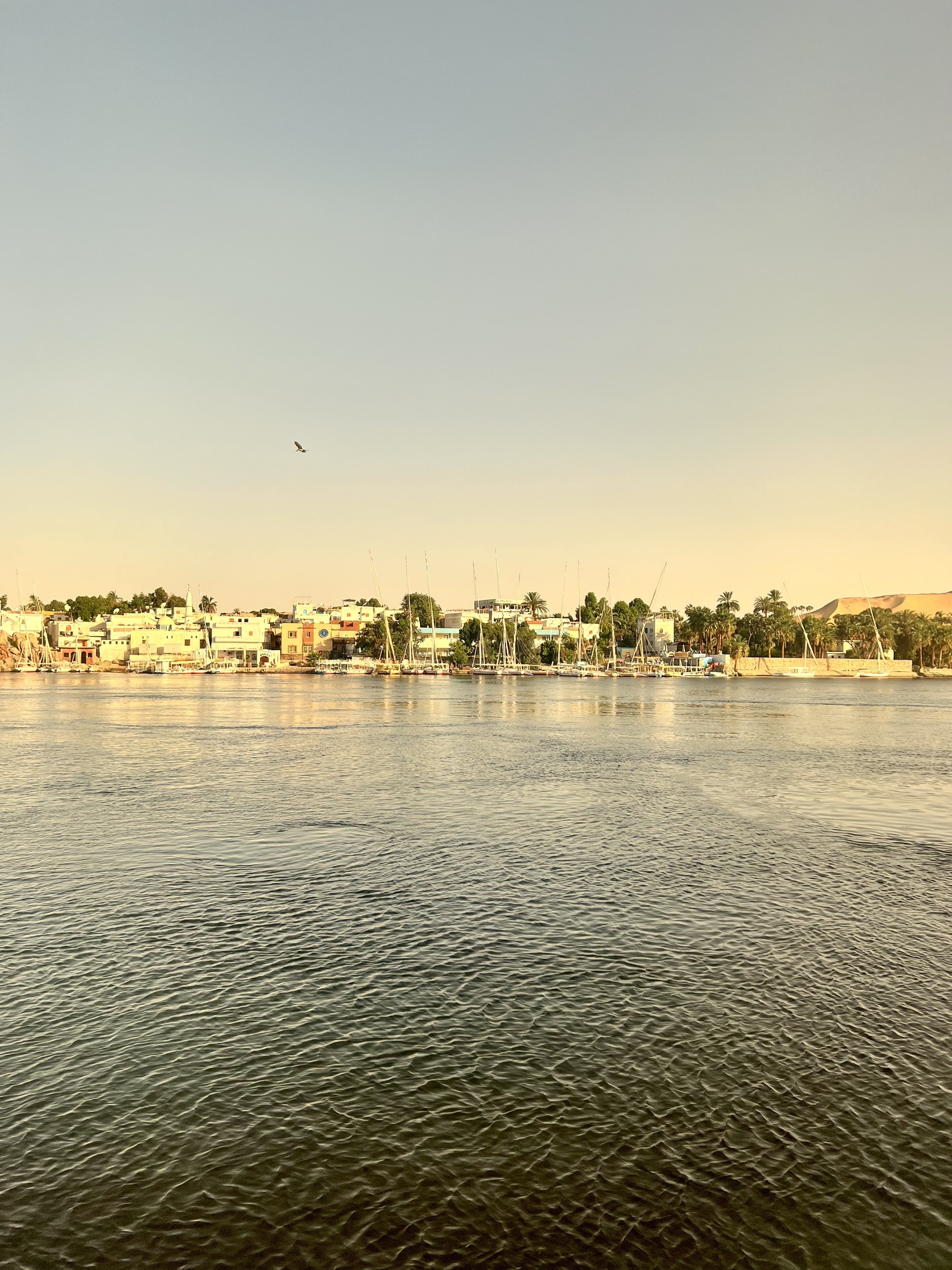
Monastery of St. Simeon
discover the Monastery of St. Simeon, a testament to Egypt’s rich Christian heritage. This 7th-century monastery, once home to hundreds of monks, offers a glimpse into a bygone era of monastic life.
Explore the monastery's atmospheric ruins, including its church, refectory, bakery, and monks' cells. Imagine the monks finding solitude here amidst the stark beauty of the desert.
Reaching the monastery often involves a scenic hike or camel ride, allowing you to soak up the tranquility of the surrounding landscape.
The Nubian Museum
Immerse yourself in the captivating world of Nubian culture and history at the Nubian Museum. This world-class museum houses a remarkable collection of ancient artifacts, intricately crafted pottery, jewelry, and statues that offer a glimpse into the rich cultural heritage of the Nubian people.
Explore exhibits that trace the evolution of Nubian civilization from its ancient origins through various historical periods. The museum's thoughtful displays and informative explanations provide a comprehensive understanding of this resilient culture.
Don't miss the museum's beautiful gardens, offering a serene setting to reflect on your journey through Nubian history.
Lake Nasser & the Temples of Kalabsha
Embark on a scenic boat trip to Lake Nasser, the vast expanse of water created by the construction of the Aswan High Dam. As you cruise across its sparkling surface, discover the Temples of Kalabsha, relocated to their current location to save them from the flooding caused by the dam.
Explore the well-preserved Temple of Kalabsha, dedicated to the Nubian god Mandulis, and marvel at its impressive sandstone structure, towering pylons, and intricate carvings. These temples stand as a testament to the efforts made to preserve Egypt’s ancient treasures.
Take in the panoramic views of Lake Nasser's vastness, contrasting with the rugged desert landscape. The lake's serene beauty and the grandeur of the relocated temples create a truly unforgettable experience.
Aga Khan Mausoleum
Perched atop a hill on the west bank of the Nile, the Aga Khan Mausoleum stands as a serene and elegant final resting place. While the mausoleum itself isn't open to the public, the journey to reach it is worth the effort.
The Aga Khan, a prominent leader of the Ismaili Muslim community, found solace in Aswan's beauty. You’ll reach the mausoleum after a peaceful boat ride and a scenic walk offering stunning views of the Nile and the surrounding landscape.
While you're in the area, take the opportunity to explore the nearby Fatimid Cemetery, adorned with ancient tombs and offering a glimpse into Aswan's rich historical tapestry.
Unfinished Obelisk
Discover the secrets of ancient Egyptian construction techniques at the Unfinished Obelisk. Located in the northern granite quarries of Aswan, this massive obelisk was abandoned mid-carving due to a crack in the granite.
Imagine the sheer scale of the project and the immense labor involved as you stand before this colossal stone. The unfinished state of the obelisk provides valuable insights into the ancient Egyptians' methods of quarrying, shaping, and transporting these massive monuments.
As you explore the surrounding quarries, you'll gain a deeper appreciation for the ingenuity and craftsmanship of one of history's most advanced civilizations.
Royal Tombs (Qubbet El-Hawa)
Uncover the intriguing history of Aswan by exploring the royal tombs at Qubbet el-Hawa. These ancient burial grounds, overlooking the Nile River, hold the final resting places of nobles and officials dating back to the Old Kingdom. Marvel at the intricate inscriptions and architectural details that offer a glimpse into the customs and beliefs of ancient Egyptians. A visit to these tombs provides a unique opportunity to connect with the past and immerse yourself in the rich heritage of Upper Egypt. Delve into the stories of the past and experience the allure of Aswan's royal tombs, accessible by a local public ferry from the West Aswan Public Ferry Dock. Don't forget to also visit the Karnak Temple, where you can find the unfinished obelisk commissioned by Queen Hatshepsut, and take a hike up the nearby sand dune for a breathtaking view of the Nile River.
Day Trips and Excursions from Aswan
Abu Simbel
A visit to Abu Simbel is a journey back in time to witness one of Egypt's most iconic archaeological sites. Located about 280 kilometers southwest of Aswan, these majestic temples were carved into a mountainside during the reign of Ramses II in the 13th century BC. The grand entrance features colossal statues of Ramses II, each standing at 20 meters tall. The temples were meticulously relocated in the 1960s to save them from the rising waters of Lake Nasser. The intricate interiors and awe-inspiring scale of these temples offer a profound glimpse into ancient Egyptian grandeur.
Temple of Kom Ombo
The Temple of Kom Ombo, dedicated to the crocodile god Sobek and the falcon-headed god Horus, stands as a unique dual-temple structure. Located on the banks of the Nile about 50 kilometers north of Aswan, the temple’s symmetrical design allows visitors to explore its distinctive layout. Marvel at the detailed reliefs depicting medical instruments, the god Sobek with his crocodile head, and Horus with his falcon features. The temple’s serene setting and intricate carvings make it a fascinating stop on your journey through Egypt.
Temple of Edfu
Step into the world of ancient Egypt at the Temple of Edfu, dedicated to Horus, the falcon-headed god. This well-preserved temple, located about 110 kilometers north of Aswan, is renowned for its grandeur and detailed hieroglyphs. Walk through the grand entrance and admire the towering pylons, expansive courtyard, and the richly decorated hypostyle hall. The temple provides valuable insights into ancient Egyptian religious practices and architectural achievements, offering a vivid experience of Horus’s mythological significance.
Conclusion
Aswan, Egypt's southern jewel, offers a rich tapestry of cultural and historical experiences. From the grandeur of the Philae Temple and serene Nile cruises to the charming Nubian villages and modern marvels like the Aswan Dam, this city promises a blend of ancient wonders and contemporary comforts. Whether you stay in a luxurious hotel or a cozy Nubian guesthouse, and whether you navigate by foot, taxi, or ferry, Aswan's unique allure is sure to create lasting memories. Consider day trips to Abu Simbel and the Temple of Edfu to enhance your exploration. Check out my Complete Travel Guide to Egypt for more information on the different places to add to your visit!
Frequently Asked Questions
What is the Best Way to Travel from Cairo to Aswan?
For a scenic journey, the sleeper train is a great option, while those short on time can opt for a direct flight to Aswan Airport. Travel guides often mention both options, highlighting the scenic beauty of the train journey.
How Many Days are Recommended to Fully Experience Aswan?
It’s recommended to spend at least 3-4 days to have enough time to explore the main tourist attractions, ancient sites, and immerse yourselves in the local culture. You could easily add another day or two if you plan on a day trip to Abu Simbel.
Is it Better to Stay in Luxor or Aswan?
Both cities offer incredible historical landmarks and accommodation options. It often comes down to personal preference and your overall travel itinerary. You may choose to visit both by taking a Nile Cruise!
What is the Best Time to Visit Aswan?
Peak season, with ideal weather conditions, is between October and April. For those who don't mind the heat, visiting during the summer allows for pleasant Nile River cruises in the late afternoon and the opportunity to experience local festivals.
Travel Tip
If you can manage your time in the heat, I recommend visiting during the summer time because there are fewer tourists. Just be sure to drink a lot of water to stay hydrated.
My Playlist for Aswan, Egypt
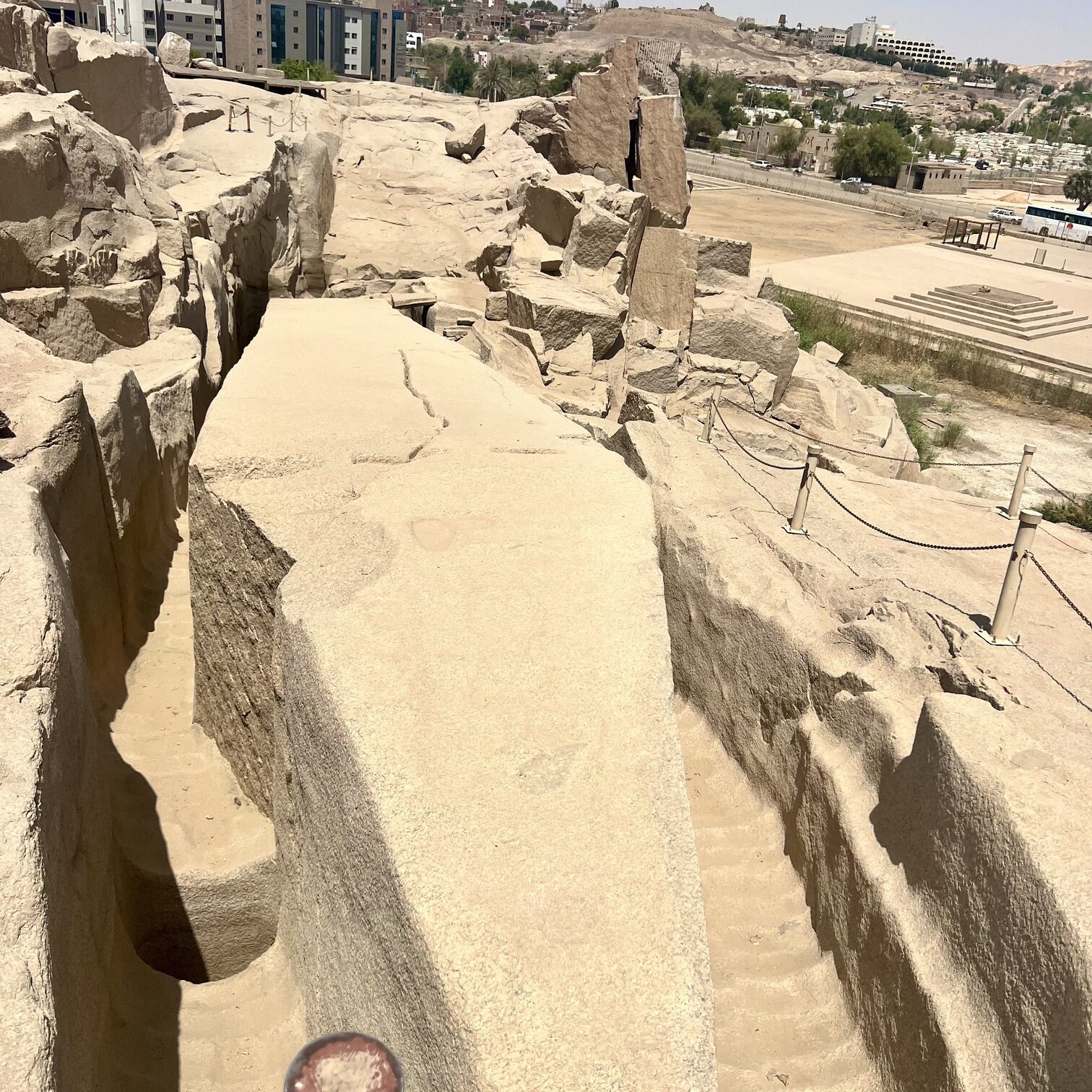
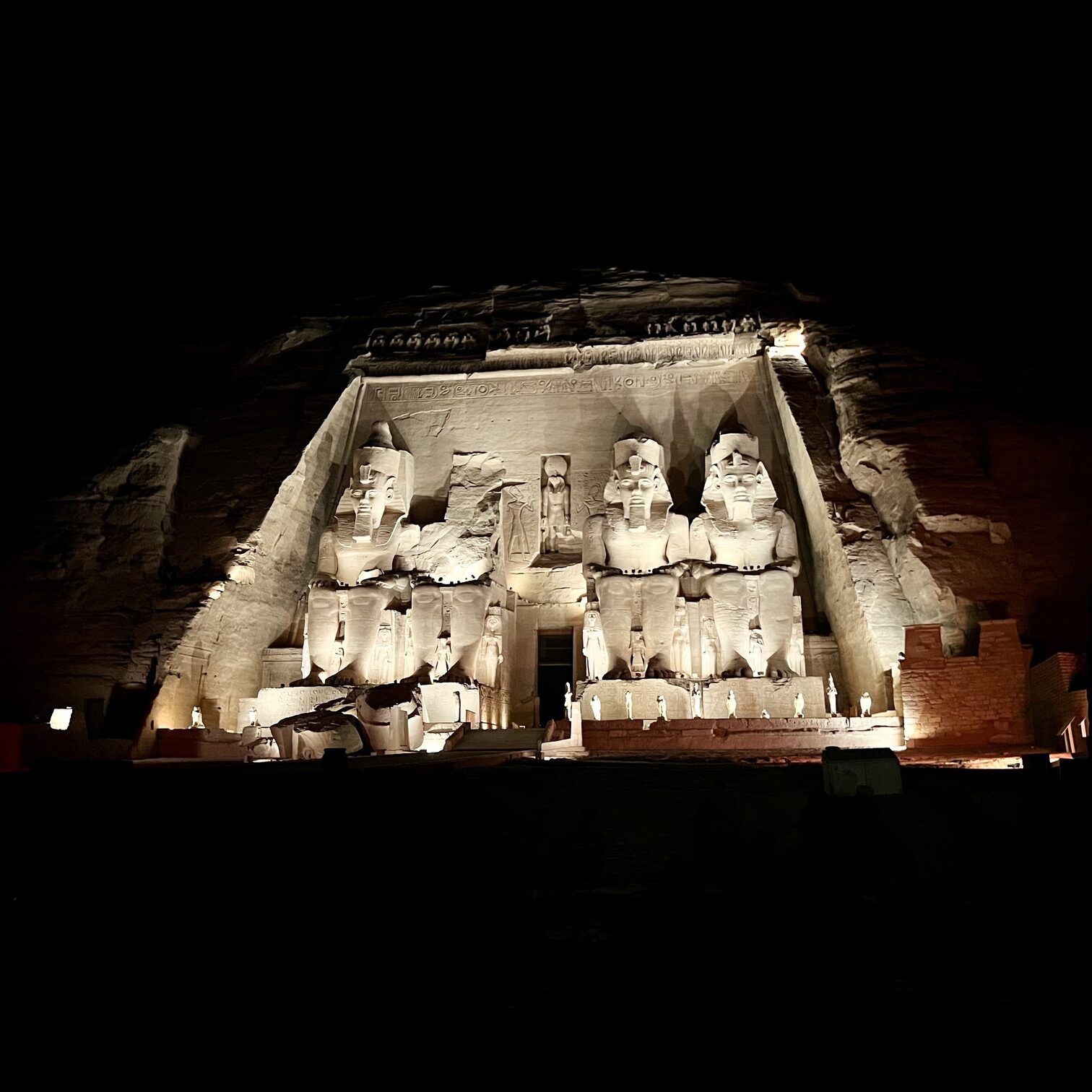
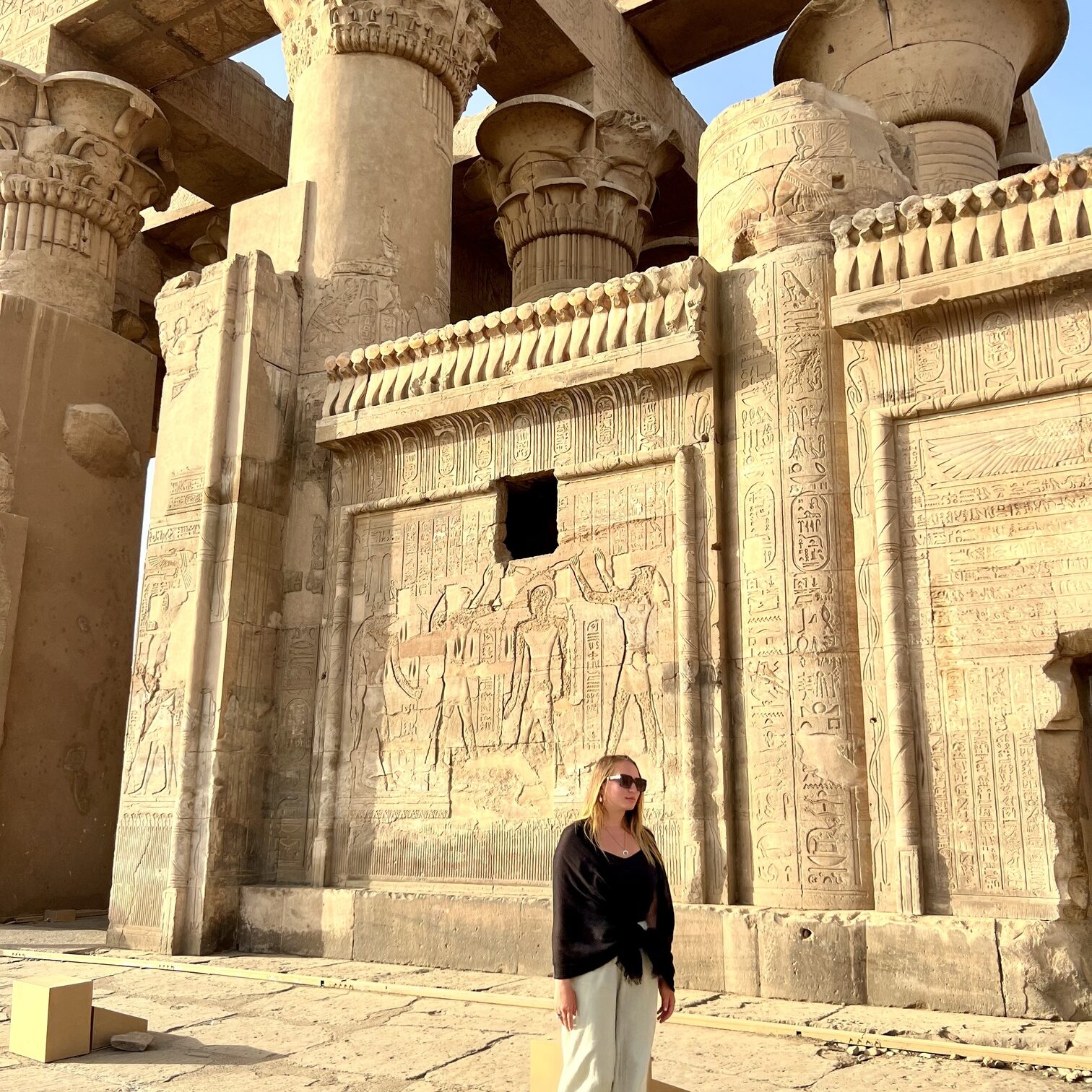
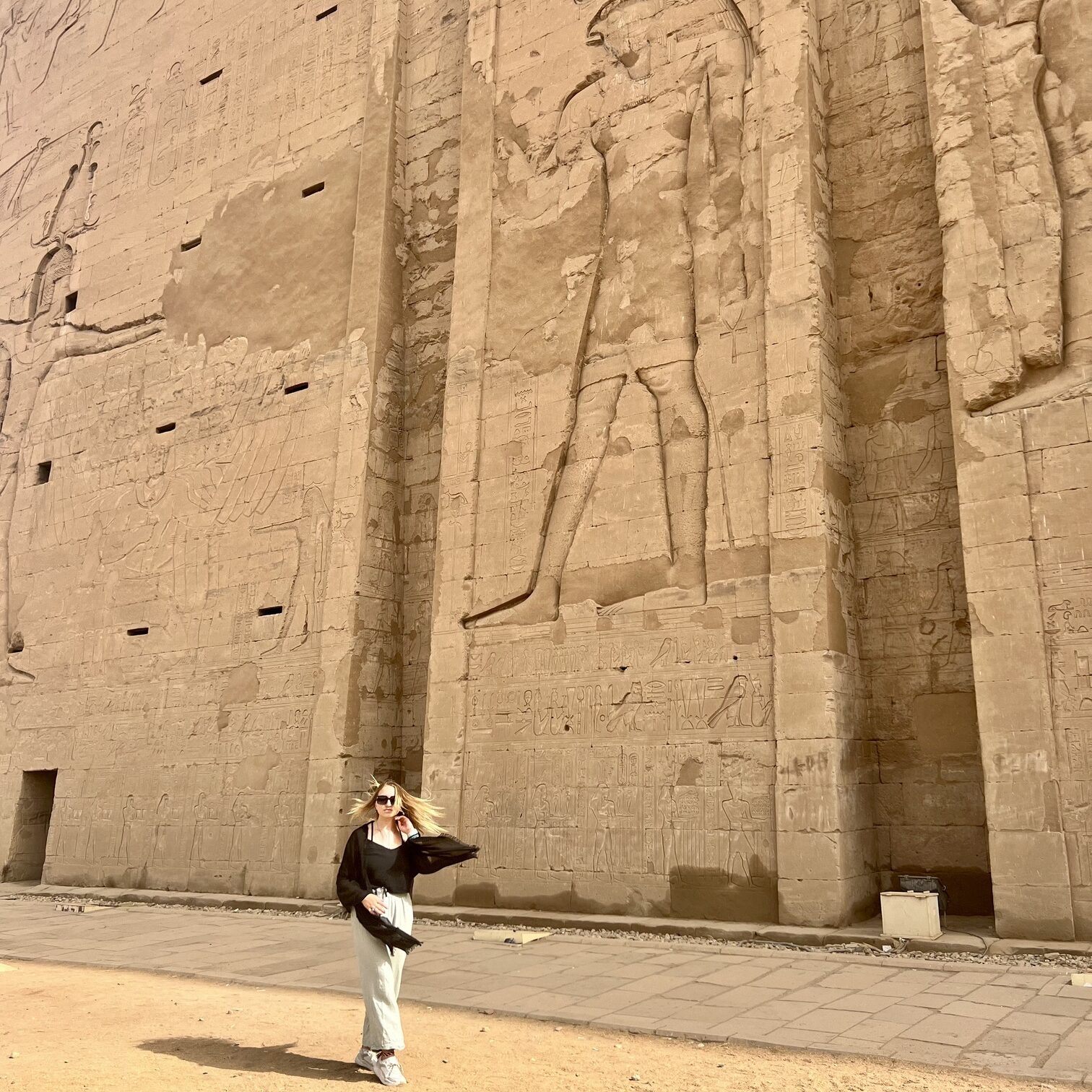
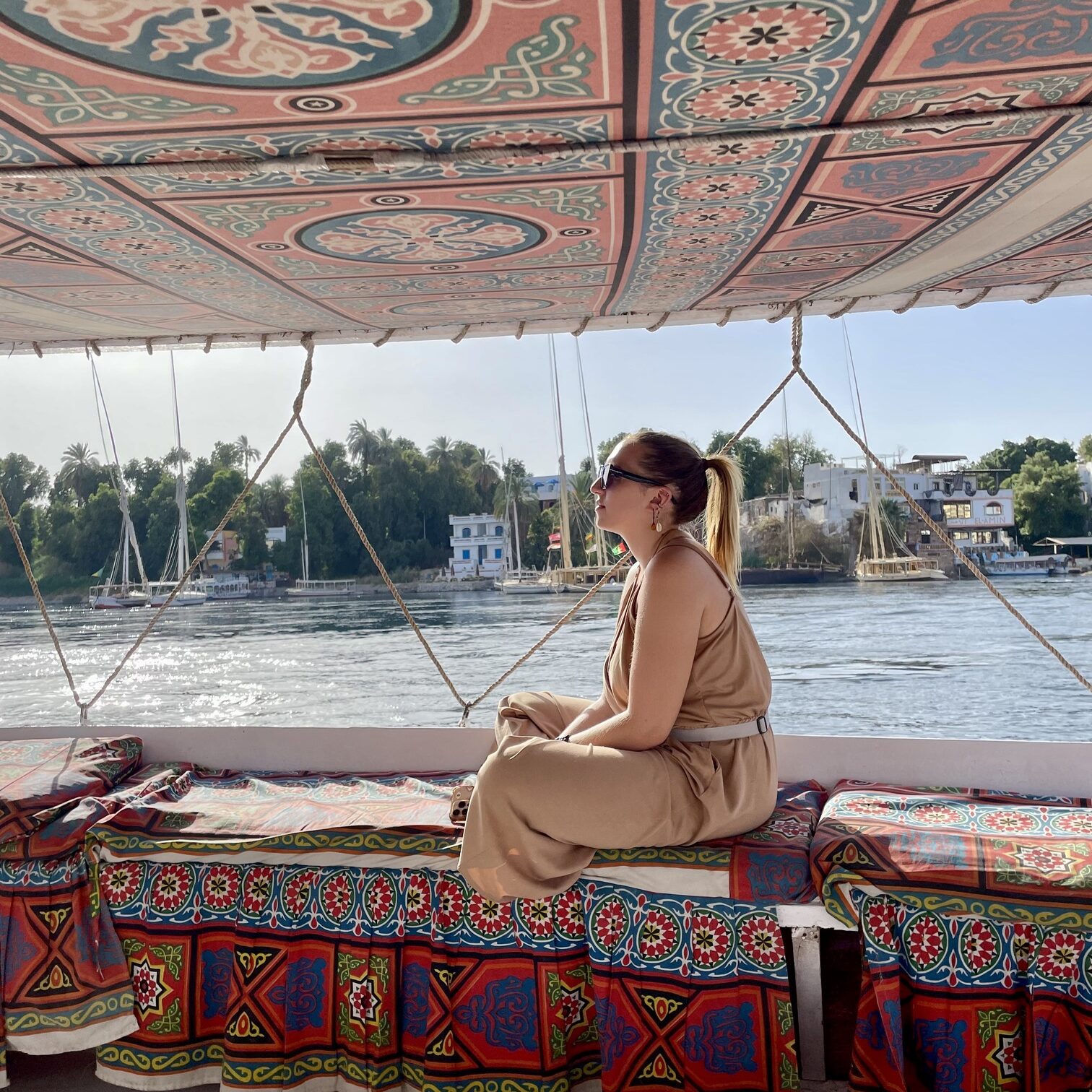
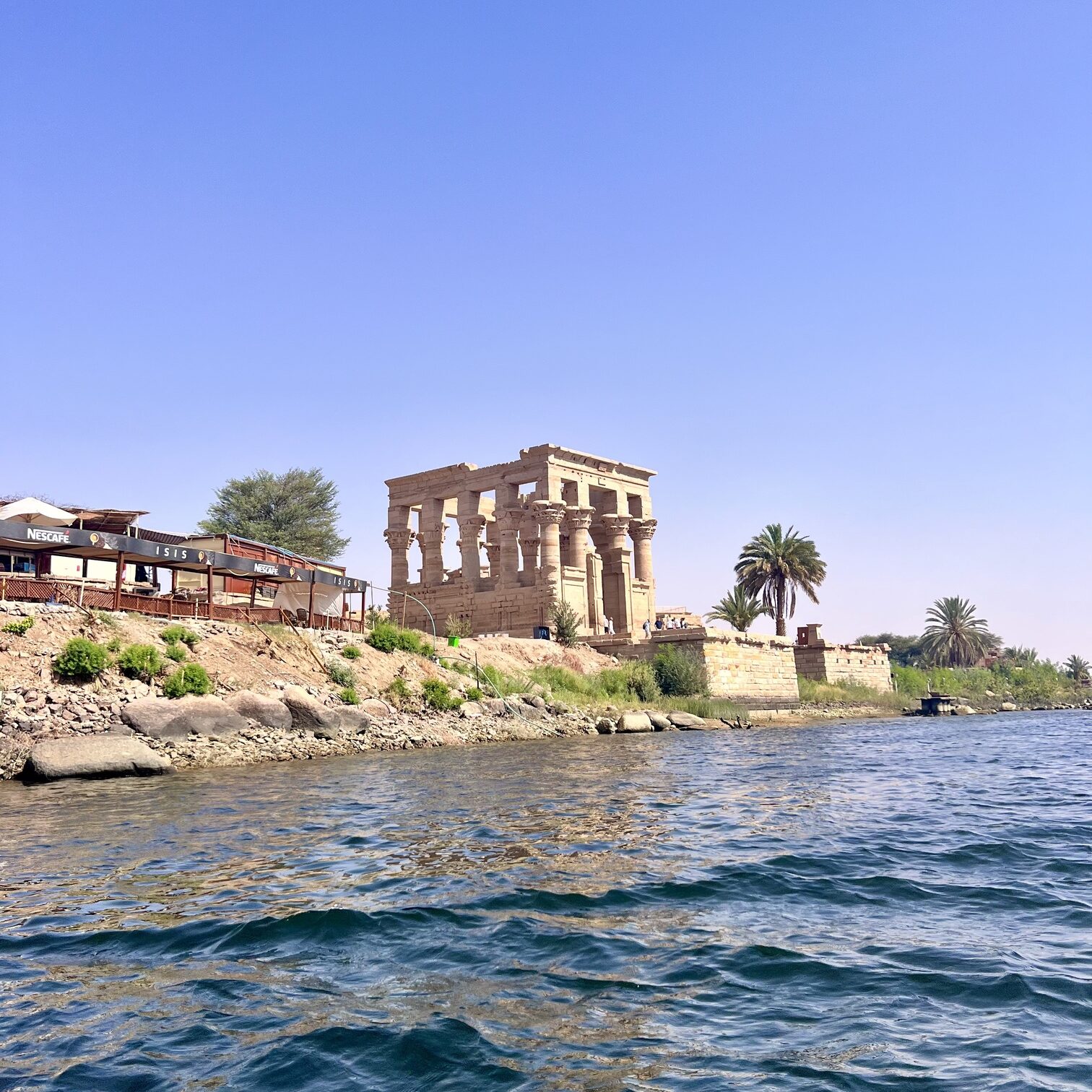
Recommended Reads
Best Foods to Try in Pennsylvania for Your Next Trip
Best Foods to Try in Pennsylvania- Key Highlights Introduction In Pennsylvania, simple things turn into something good…
Best Places to Visit in Pennsylvania: Adventure Awaits!
Best Places to Visit in Pennsylvania- Key Highlights With Pennsylvania’s rich variety, there’s something for everyone, from…
10 Interesting Facts About Indiana You Didn’t Know
Key Highlights- Interesting Facts About Indiana Introduction Indiana, particularly northern Indiana, is often called the “Hoosier State.”…



